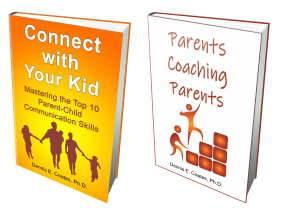It’s hard enough managing everything in a life – home, meals, bills, etc. Add to that being exhausted from a stressful job or raising kids. Or both! And further, add to that the pain of frustration, disappointment, or discouragement when your child doesn’t do what’s expected, complains, or lashes out in anger.
It’s only natural for you to react emotionally when your child acts like, well, a child. The problem is, reacting instinctively almost always makes things worse. It feed a vicious downward spiral. Every time you “hit back,” reacting emotionally, it eats away at a child’s self-esteem.
Raising kids isn’t for sissies, as someone once told me.
When it seems as if your child is about to ruin your day, the solution is one recommended by nearly all parenting experts: respond not from your own emotional angst, but with expressions of empathy. Truthfully, very few kids have what you might call an evil temperament – a perverse desire to inflict pain on others. Nearly all kids act out because a legitimate need isn’t being met:
- Needing rest to recover from their own fatigue
- Hunger or other basic need not met
- Disappointment because something didn’t go their way
- Anxious because of discord in the parental relationship
- Fear of punishment or abuse
- Confusion about a hard choice
- And more…
They’re acting out because they aren’t self-aware enough to know why they feel bad and they aren’t skilled at expressing themselves. So their unhappiness is communicated in inappropriate, aggravating ways.
What they need from you is understanding. They want you to know how they feel and why, so you can help them get they need. This means exercising empathy and expressing your sense of their pain, followed by your best listening to interpret what they say. Most of the time, the support and encouragement they need is simple to give.
This probably sounds “right on,” but of course simple doesn’t always equate to easy. Because what you need to do is shift your focus from your pain to their pain – before you react. And you need to make this a habit, which will involve a persistent effort.
Responding this way on a regular basis will take a lot of practice and learning from your mistakes. I assume your heart is full of love for your child, or you wouldn’t be reading this. That love can fuel your consistent effort to shift your focus from “my bad place” to “your child’s bad place” an automatic habit. Instead of yelling, arguing, and fighting, you can be connecting, discussing, and resolving.
The goal is that upward, positive spiral (instead of that vicious downward spiral), driven by your desire to help your child deal with life’s daily aggravations. Your empathy, support and encouragement will be the manifestation of love they’re nearly always asking for.
More truth-telling about parent-teen communication.
My how-to book about communicating with your child: Connect with Your Kid: Mastering the Top 10 Parent-Child Communication Skills.
 This book, along with Parents Coaching Parents, will help you make change happen.
This book, along with Parents Coaching Parents, will help you make change happen.
You can grow the bond with your child through better listening. Download the FREE ebook, Listening to Understand.

